All products featured are independently chosen by us. However, SoundGuys may receive a commission on orders placed through its retail links. See our ethics statement.
Sony WF-1000XM5 vs Samsung Galaxy Buds 2 Pro
February 5, 2025

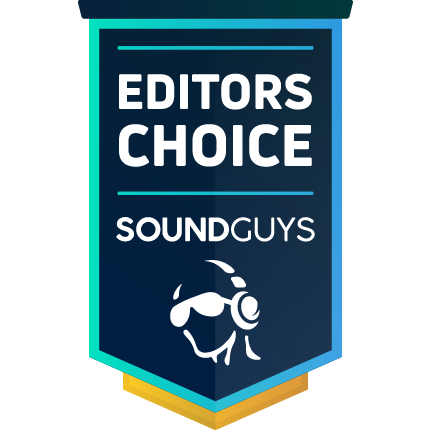
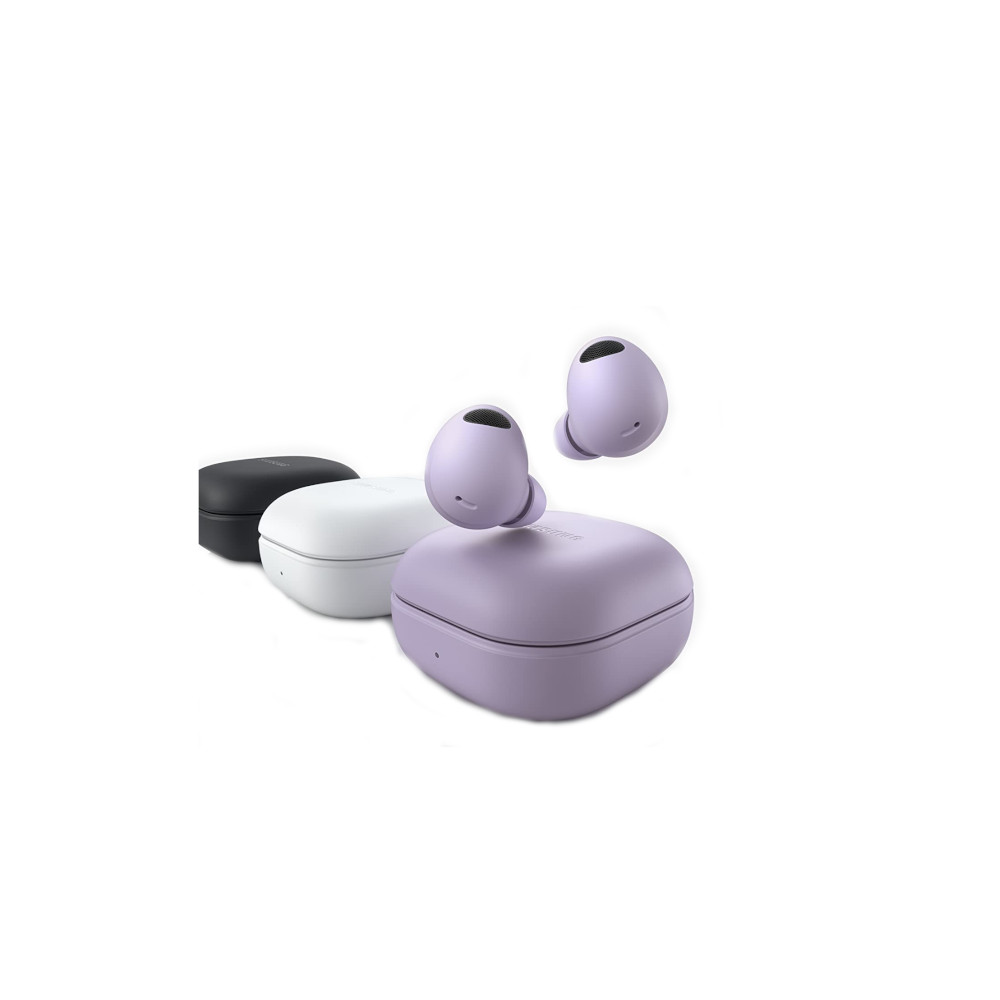
Sony introduced an update to its winning formula with the WF-1000XM5. These buds are smaller and lighter than before. Meanwhile, the Samsung Galaxy Buds 2 Pro have proven themselves as excellent flagship buds with standout active noise canceling (ANC). Let’s check out the differences and similarities in this Sony WF-1000XM5 vs Samsung Galaxy Buds 2 Pro and decide which wireless earbuds make sense for you.
- February 5, 2025: We added a section on how the Galaxy Buds 3 Pro compare.
- March 8, 2024: We added MDAQS scores and comparison in the sound quality section and added the Bose QuietComfort Ultra Earbuds to our alternatives.
What’s it like to use the Sony WF-1000XM5 compared to the Samsung Galaxy Buds 2 Pro?
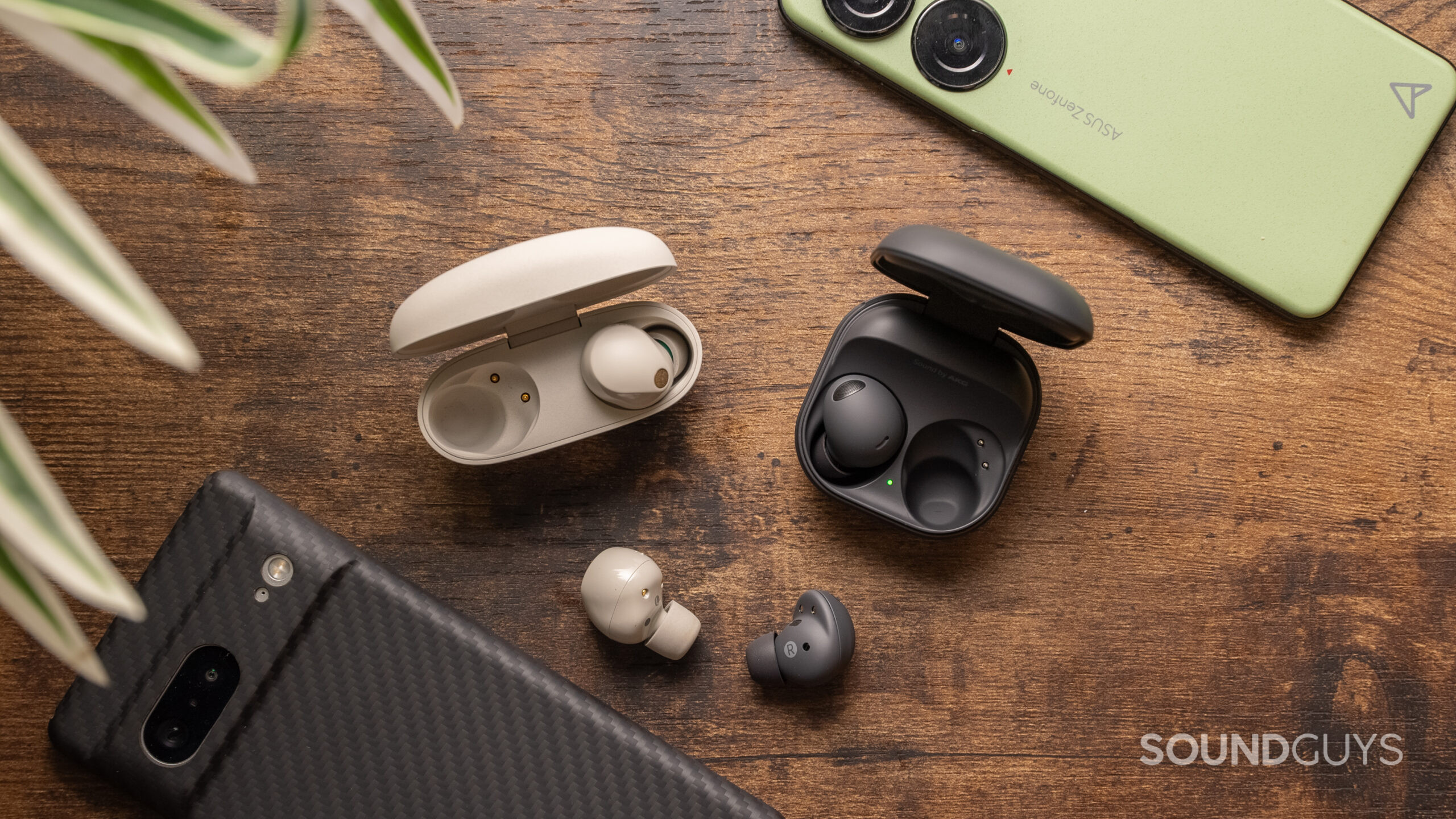
Sony shrunk the WF-1000XM5 to 25% smaller than the previous buds. Now, at 6g per bud, the WF-1000XM5 are decidedly sleeker. Sony’s buds lack stabilizers and rely on a solid in-ear fit, which you can gain by choosing one of four dense memory foam ear tips (XS-L). The latest Sony earphones use the IPX4 rating, so they’re splashproof and sweatproof. If they fit you well, you can take them to the gym, no problem.
The sturdy case looks similar to the WF-1000XM4 and snaps shut satisfyingly. Sony loads the WF-1000XM5 with features like DSEE Extreme, Dolby Atmos, and Sony 360 Reality Audio with head tracking. Once paired, you’ll want to explore the Sony Headphones Connect app for the full experience.
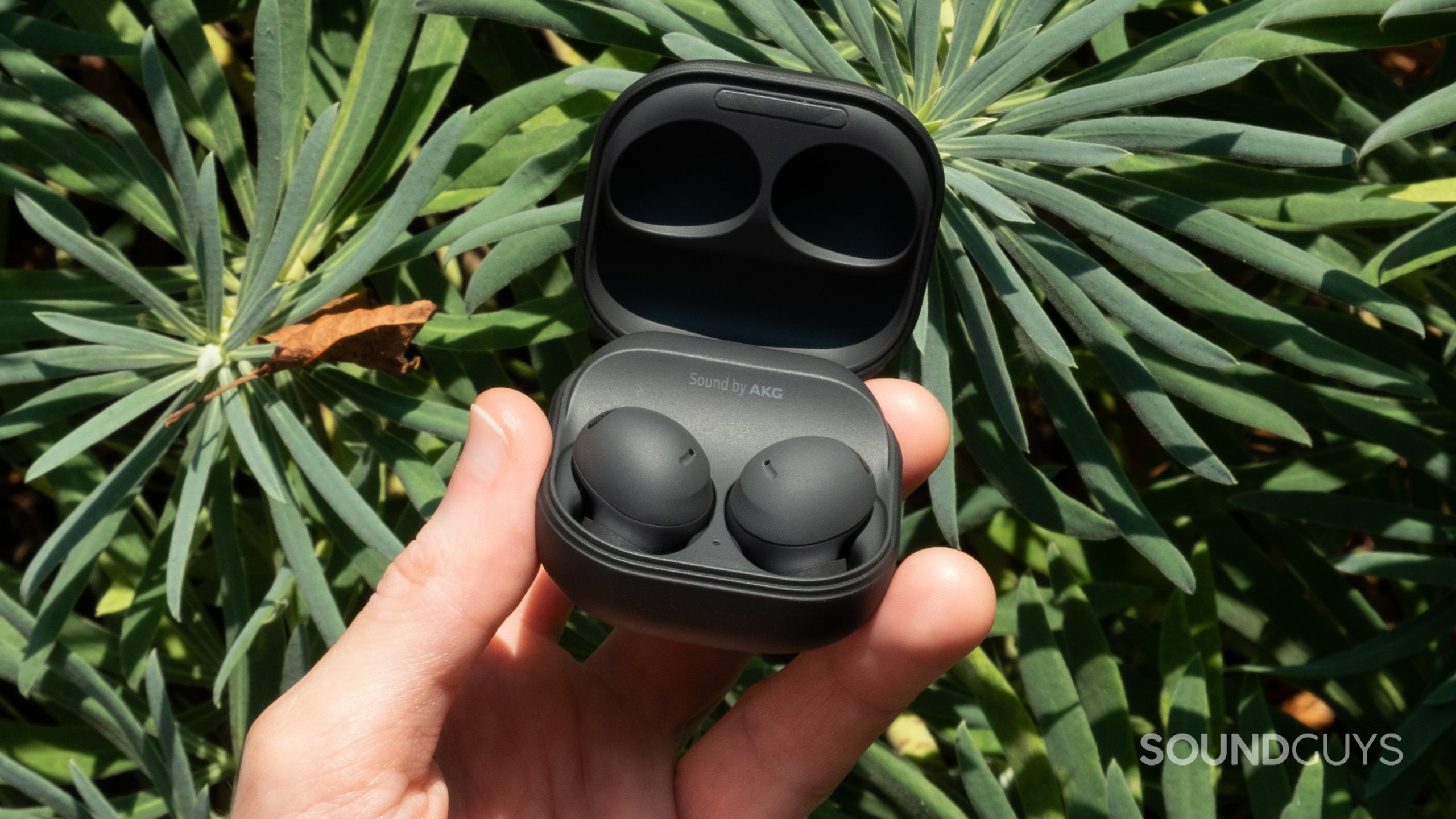
Samsung has a recent history of pint-sized earbuds, and the 5.5-gram (per bud) Samsung Galaxy Buds 2 Pro are no exception. Like the WF-1000XM5, these lack stabilizing wings; however, the shape of the buds makes it easy to slip them in. Samsung includes three sets of silicone ear tips (S-L) with the Galaxy Buds 2 Pro. These tips are comfortable and easy to swap. One-upping Sony, the Galaxy Buds 2 Pro has a superior, effectively waterproof IPX7 rating.
The Galaxy Buds 2 Pro has some potentially great features, such as 24-bit audio (for Samsung devices), Dolby Atmos, spatial audio with head tracking, and improved touch controls. Unfortunately, the matte textured finish that helps to lock in the buds can pick up scratches and dust.
The WF-1000XM5 is available in Black or Silver, and the Galaxy Buds 2 Pro is available in Bora Purple, Graphite, and White.
How do you control the Sony WF-1000XM5 and Samsung Galaxy Buds 2 Pro?
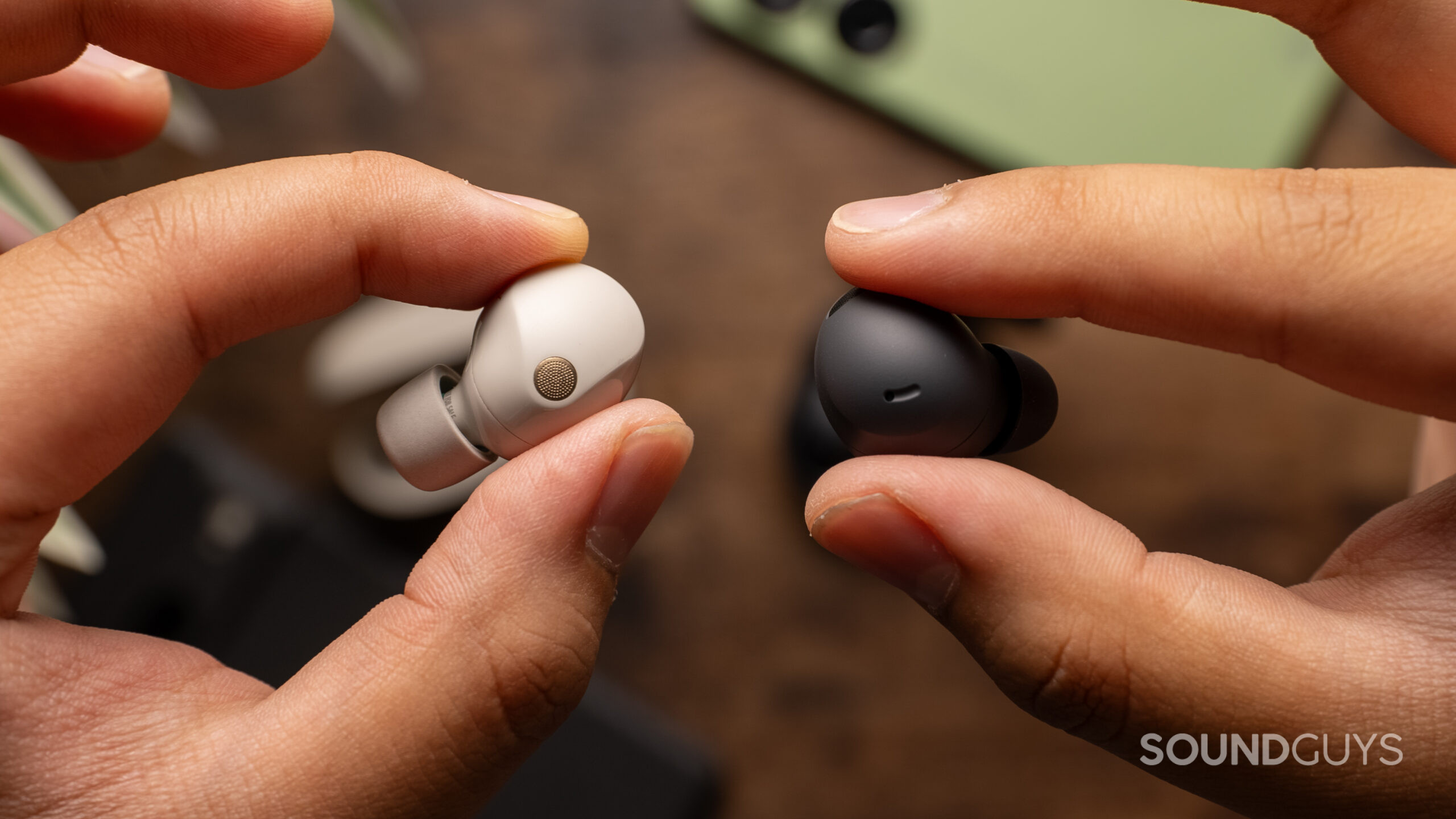
Sony improved on the previous generations and expanded the WF-1000XM5’s touch controls. With the latest buds, you can adjust the volume without reaching for your phone. The buds usefully include in-ear detection for auto-play/pause. If you remove one earbud, the other one will enter passthrough mode and pause your audio.
Many of the default controls shown are customizable in the Sony Headphones Connect app.
Sony WF-1000XM5 controls:
| Input | Left earbud | Right earbud |
|---|---|---|
| Input One tap | Left earbud ANC/Ambient sound | Right earbud Play/Pause |
| Input Two taps | Left earbud Quick Access | Right earbud Next |
| Input Three taps | Left earbud Quick Access | Right earbud Previous |
| Input Four taps | Left earbud Volume Down | Right earbud Volume Up |
| Input Tap and hold | Left earbud Quick Attention | Right earbud Voice Assistant |
Like the WF-1000XM5, the Samsung Galaxy Buds 2 Pro utilizes touch controls. Previous Galaxy Buds releases were infamous for their hypersensitive touch controls, but Samsung fixed the issue on the Galaxy Buds 2 Pro.
Samsung Galaxy Buds 2 Pro controls:
| INPUT | ACTION (left bud) | ACTION (right bud) |
|---|---|---|
| INPUT ONE TAP | ACTION (left bud) Play/Pause | ACTION (right bud) Play/Pause |
| INPUT TWO TAPS | ACTION (left bud) Next track Answer/end call | ACTION (right bud) Next track Answer/end call |
| INPUT THREE TAPS | ACTION (left bud) Skip to previous track Decline call | ACTION (right bud) Skip to previous track Decline call |
| INPUT TAP AND HOLD | ACTION (left bud) Volume down Reject call Toggle ANC/ambient modes (change in settings) | ACTION (right bud) Volume up Reject call Toggle ANC/ambient modes (change in settings) |
| INPUT "Hey, Bixby" | ACTION (left bud) Voice your request or inquiry (Samsung device only) | ACTION (right bud) Voice your request or inquiry (Samsung device only) |
You can alter or reallocate controls in the accompanying app, but if you like to tinker with the control setup, Samsung only lets you reassign controls for the same type of command for press and hold. This isn’t likely an issue for most people.
Should you use the apps of either Sony WF-1000XM5 or Samsung Galaxy Buds 2 Pro?
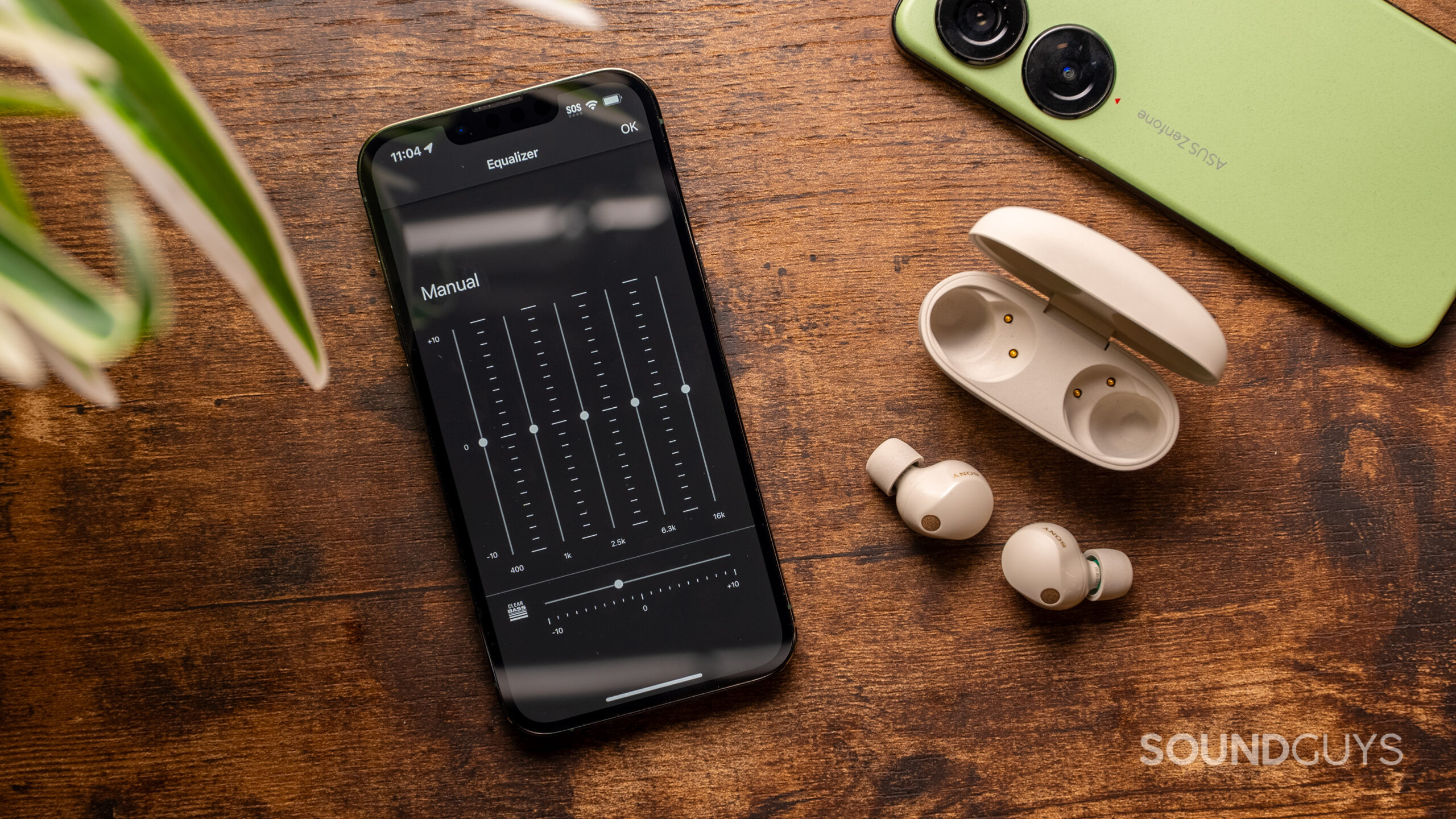
If you’re investing in high-end earbuds like the Sony WF-1000XM5 and the Samsung Galaxy Buds 2 Pro, you’ll want to download their apps, even if they collect a lot of personal data. The reason is that the Sony Headphones Connect (iOS/Android) and Samsung Galaxy Wearable (Android) apps are necessary to receive essential firmware updates. These updates can offer more control over features such as noise cancelation and sound quality. Sometimes apps aren’t good enough to justify, but at the very least, you want to dial in the controls to your liking or futz with the EQ.
The Sony Headphones Connect app supplies you with a six-band equalizer, giving you more control than the EQ presets available in the Galaxy Wearable app. You can use Sony’s app to personalize the 360 Reality Audio (aka spatial audio) experience and enable head tracking. It also enables DSEE Extreme to upscale lossy audio files. From the app, you can toggle things like Ambient Sound (aka transparency) mode, Speak-to-Chat, and Adaptive Sound Control.
Samsung has similar features in the Galaxy Wearable app for Android users only. You gain access to updates (and Samsung has been making significant updates, such as binaural audio recording using the Galaxy Buds 2 Pro); you can adjust noise canceling, customize commands, and cycle through EQ presets.
In Samsung’s increasingly walled garden, you can pair the Galaxy Buds 2 Pro with an iPhone, but you won’t get to access the app (which you want for the price). Likewise, you can connect a non-Samsung Android phone to the Galaxy Buds 2 Pro, but you won’t receive 24-bit audio from the Samsung Seamless Codec. Still, this configuration will grant you most other features. Only a Samsung device with the Samsung buds unlocks all Buds 2 Pro features, including head tracking for spatial audio content.
How do the Sony WF-1000XM5 and Samsung Galaxy Buds 2 Pro connect?
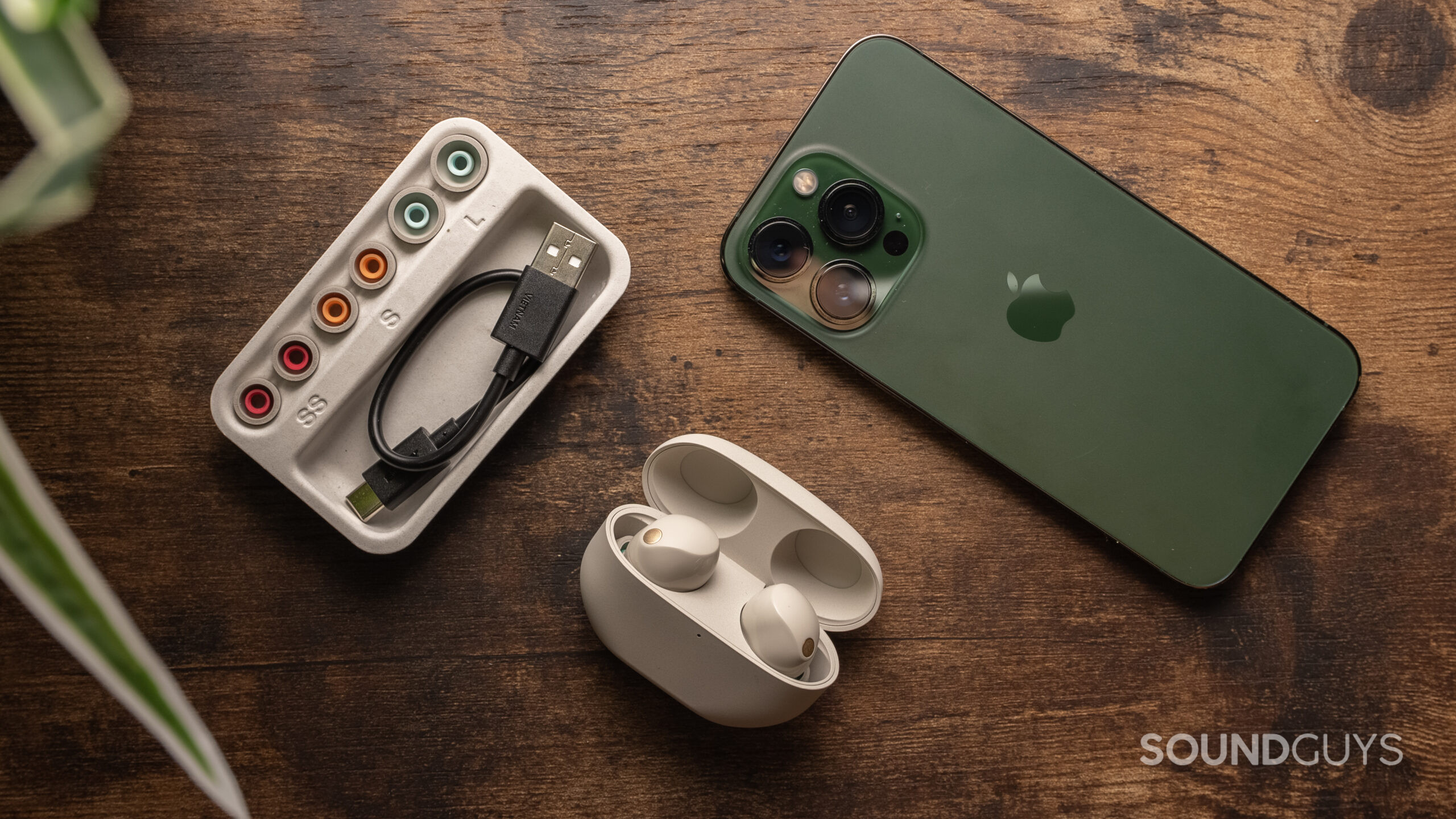
Sony uses Bluetooth 5.3 and supports the SBC, AAC, and LDAC Bluetooth codecs. Similarly, Samsung Galaxy Buds 2 Pro also uses Bluetooth 5.3 with SBC and AAC. The Galaxy Buds 2 Pro offers the Samsung Seamless Codec instead of LDAC. This codec is exclusive to Samsung devices and can transmit 24-bit audio. Meanwhile, LDAC has the potential to reach “Hi-Res,” but LDAC isn’t all it’s hyped up to be: at CD quality, LDAC 990kbps, and 660kbps are a bit better than aptX HD, but both require even more bandwidth.
In any case, if you use an iPhone, you’ll only want AAC anyway. If you have a non-Samsung Android device, you can only use SBC or AAC with the Samsung earbuds. You can access LDAC on the Sony WF-1000XM5 with any Android.
Is battery life better on the Sony WF-1000XM5 or Samsung Galaxy Buds 2 Pro?
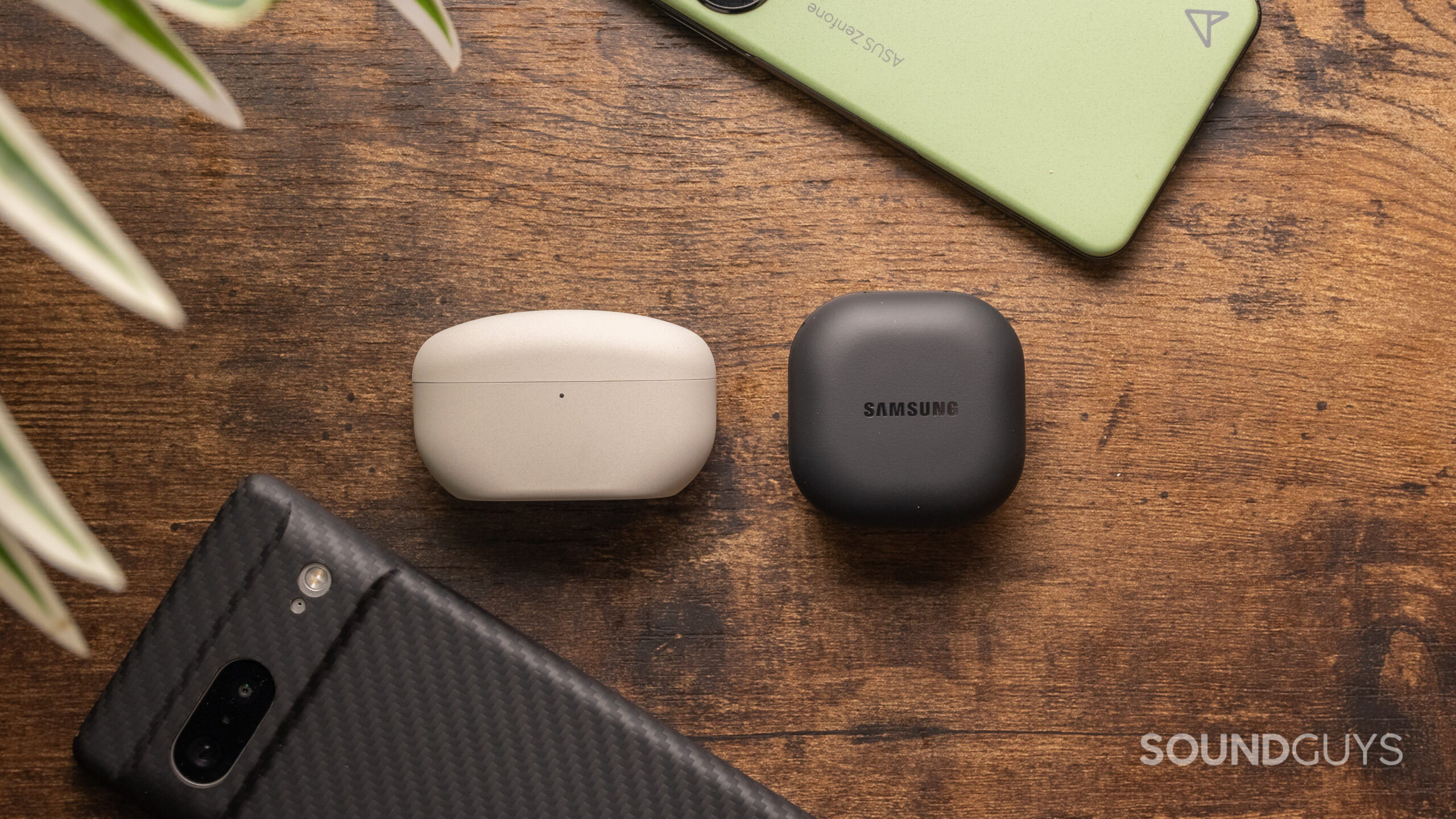
If battery life is the clincher for you, the Sony WF-1000XM5 has a significantly better battery life than the Samsung Galaxy Buds 2 Pro.
With ANC on the Sony WF-1000XM5 battery lasts 9 hours and 32 minutes when performing our standardized battery test. Lagging behind, the Samsung Galaxy Buds 2 Pro lasts 4 hours and 50 minutes when playing music, peaking at 75dB(SPL) — the same test. In total, the WF-1000XM5 provides 24 hours of juice with the case. Samsung suggests you can reach up to 30 hours of battery life with the charging case. However, that figure seems to reflect pretty different testing conditions from SoundGuys because Samsung also claims the Galaxy Buds 2 Pro has an 8-hour battery life, which we can not replicate.
Unique to the Galaxy Buds series is the ability to exchange between your Samsung Galaxy Buds 2 Pro and your Samsung device battery charge using the Wireless Powershare function. Otherwise, the Sony WF-1000XM5 and Galaxy Buds 2 Pro charge via an included USB-C cable and can charge wirelessly.
Do the Sony WF-1000XM5 or Samsung Galaxy Buds 2 Pro block noise better?
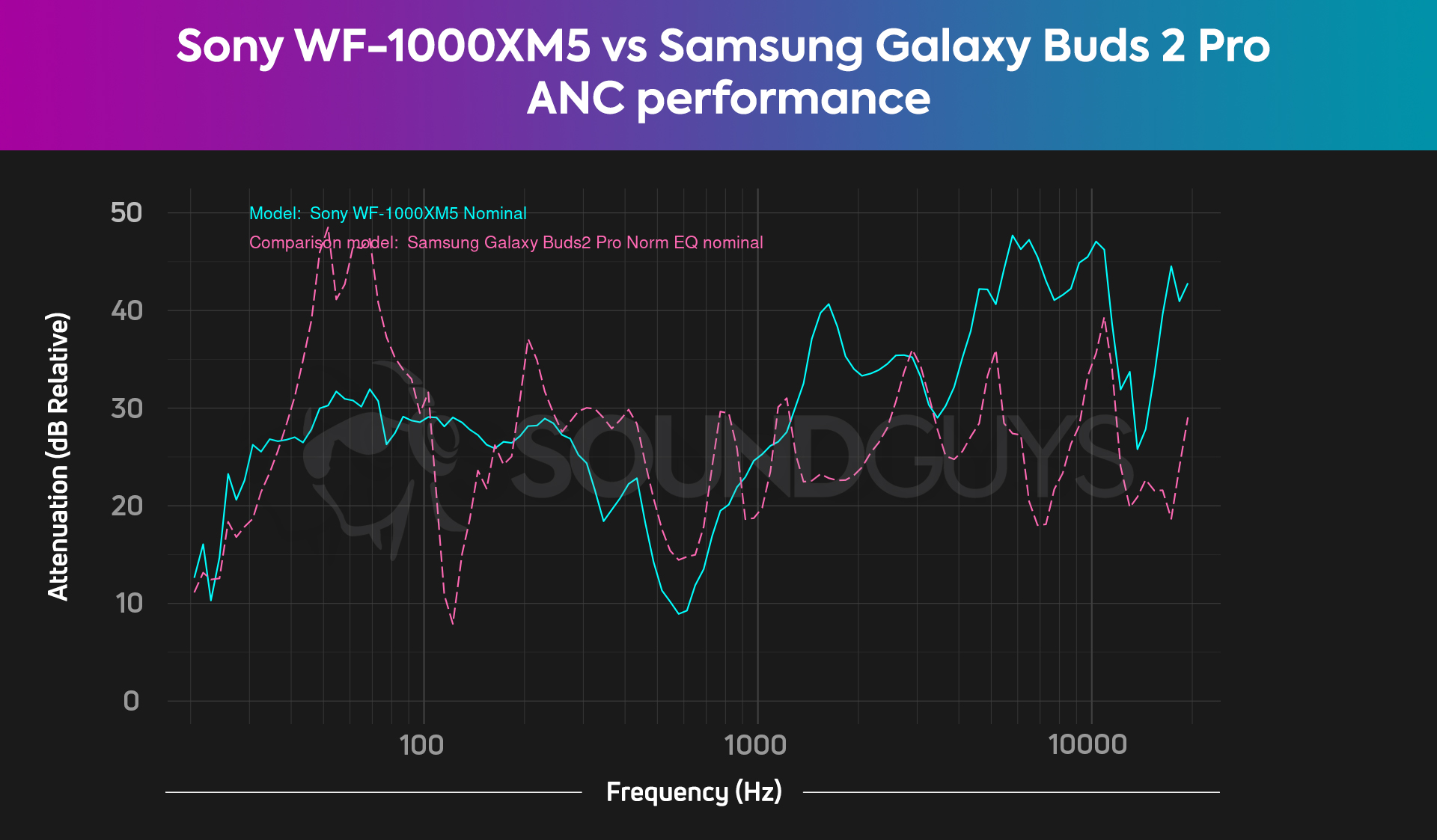
The Samsung Galaxy Buds 2 Pro cancels more noise at 70Hz — nearly 50dB in total — but the execution is less consistent than the WF-1000XM5. The ANC on the WF-1000XM5 attenuates less overall low-frequency noise, but the attenuation is more consistent, which can help avoid disorientation or a strange filtering effect. This probably won’t bother most people. We noted that the WF-1000XM5 has useful wind noise reduction as well.
Quite a lot of the Sony WF-1000XM5 attenuation is due to their redesigned ear tips, which improve isolation from external sounds. Overall, this isolation is similar to a set of good earplugs. The Samsung Galaxy Buds 2 Pro uses more conventional silicone ear tips. Although these are nicely made and easy to replace, they don’t block out as much incidental noise. In other words, clattering dishware will sound louder through the Galaxy Buds 2 Pro than the WF-1000XM5. You can attempt to improve the isolating properties of the Galaxy Buds 2 Pro with third-party ear tips made with memory foam.
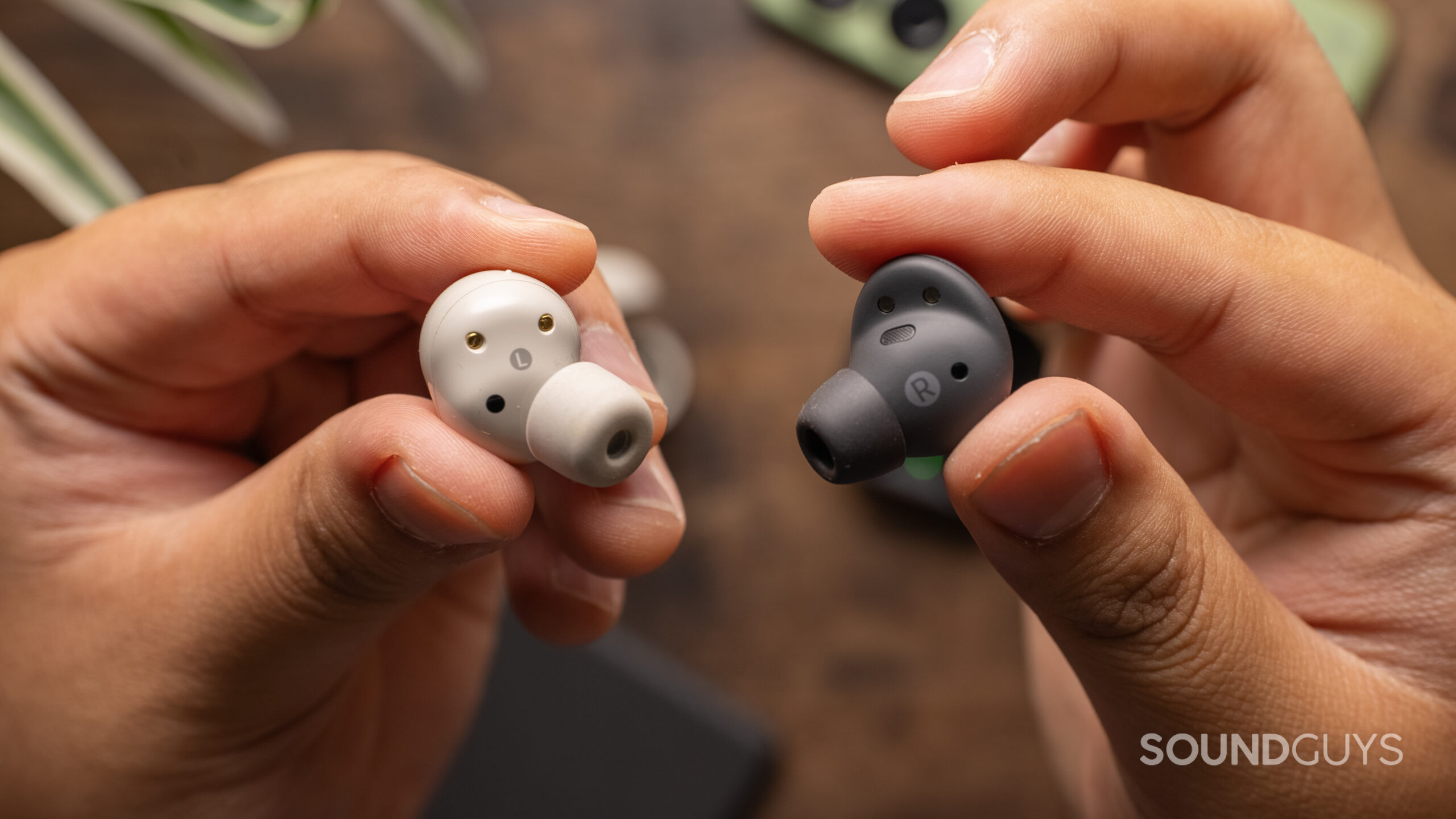
We like the WF-1000XM5 for the impressive isolation performance compared to the Samsung buds, and for the more consistent noise cancelation. However, the Samsung Galaxy Buds 2 Pro cancels more low-pitched noise. Both are great compared to what else is out there and will help with hearing loss prevention.
Do the Sony WF-1000XM5 sound better than the Samsung Galaxy Buds 2 Pro?
Multi-Dimensional Audio Quality Scores (MDAQS)
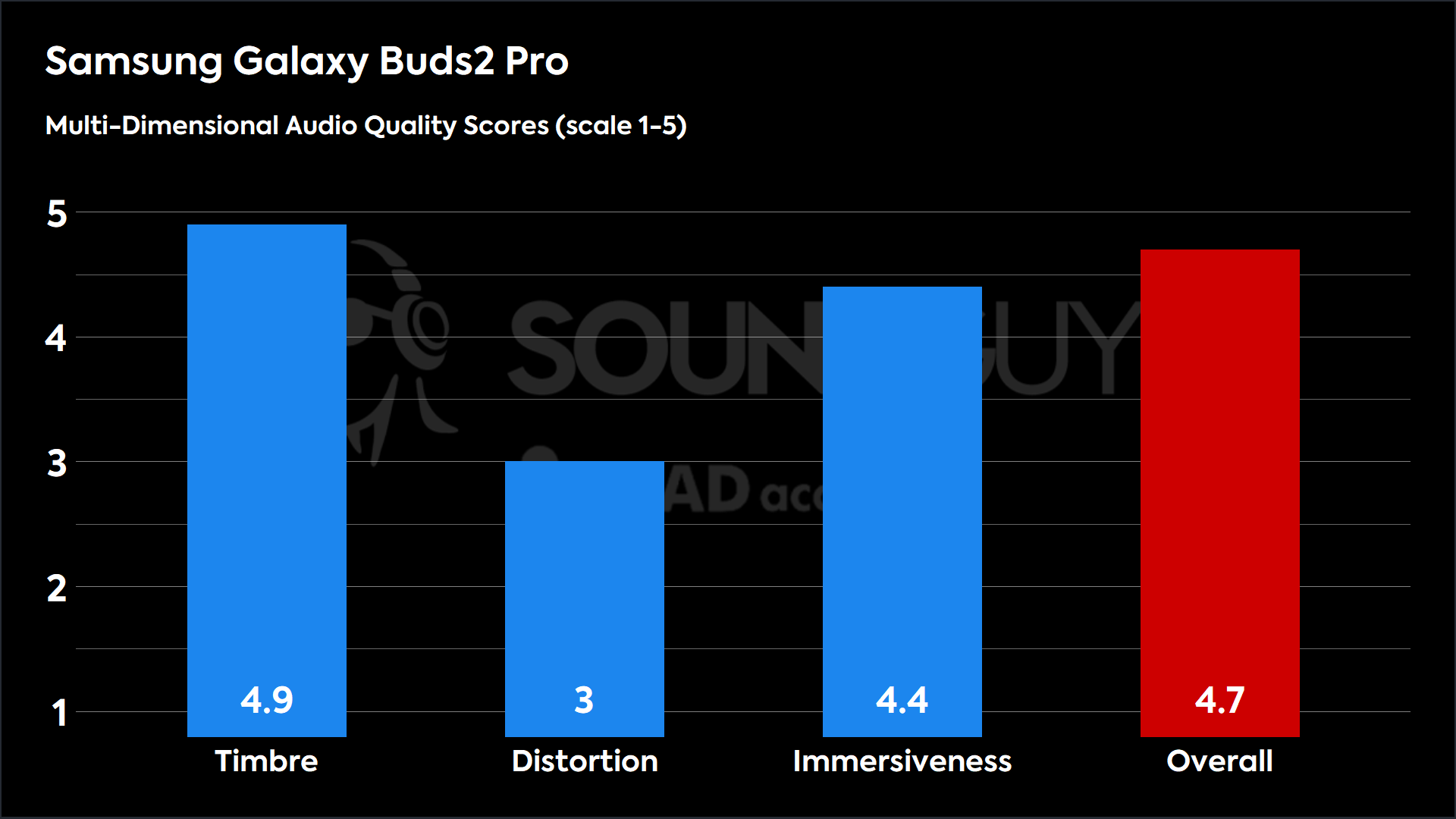
The Samsung Galaxy Buds 2 Pro scored very high for both Timbre and Immersiveness. This means most people will likely really enjoy how their music sounds on these earbuds. Though you may notice distortion now and again, it doesn’t seem to rise to the level of being all that annoying to a virtual panel of hundreds of listeners. An overall score of 4.7 is high for the wireless earbuds we’ve tested.
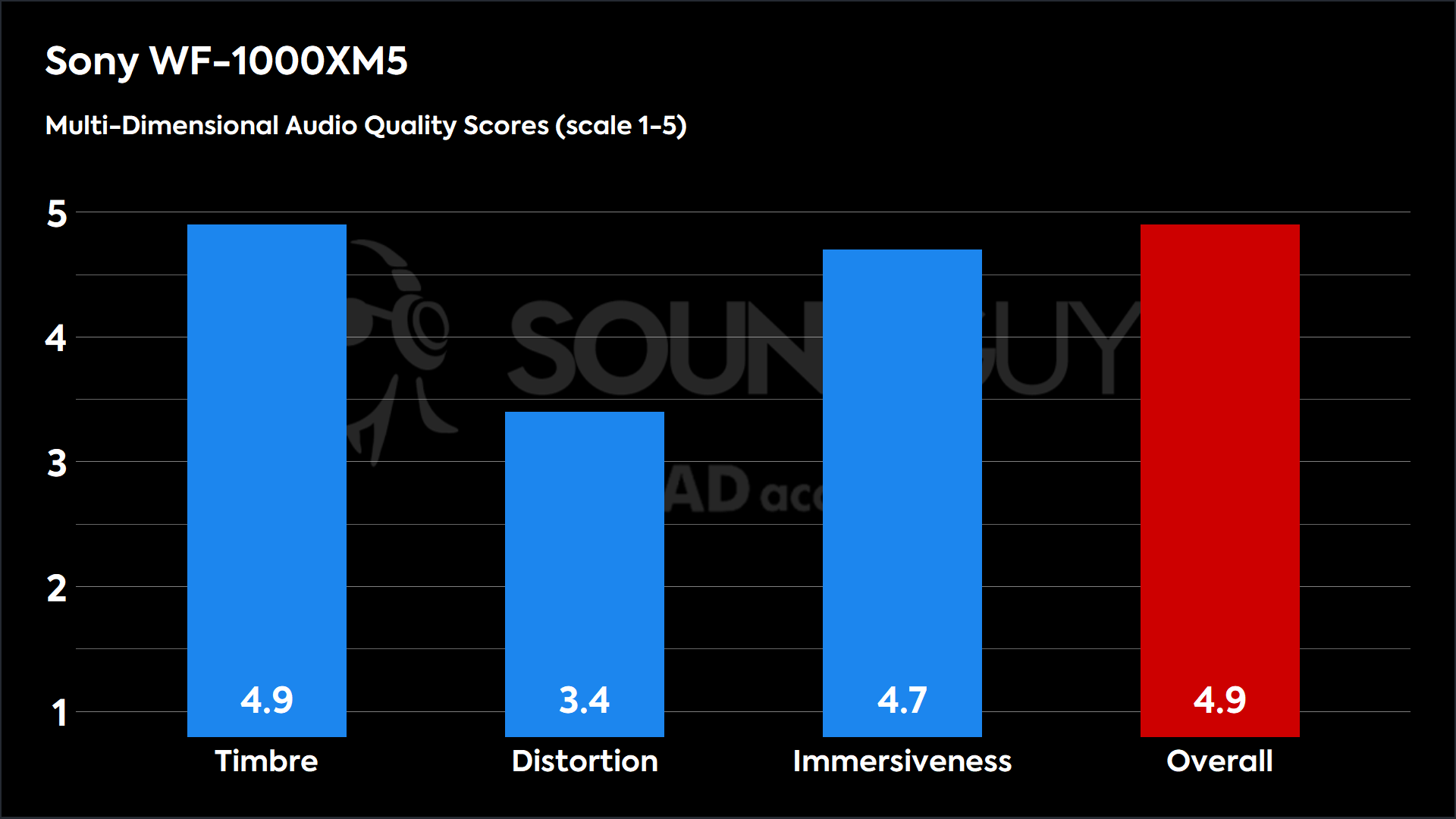
For most people, the sound of the Sony WF-1000XM5 will be pleasing, owing to its tuning and strong ability to maintain a convincing illusion of 3D space with a stereo image. Overall, these earbuds post one of the highest MDAQS ratings we’ve come across, which means there’s a high likelihood that you’ll like their sound.
Timbre (MOS-T) represents the headphones’ spectral properties (how faithfully they reproduce the frequency spectrum) and temporal resolution (timing).
Distortion (MOS-D) represents non-linearities and added noise: higher scores mean cleaner reproduction.
Immersiveness (MOS-I) represents perceived source width and positioning: how well virtual sound sources are defined in three-dimensional space.
See here for a detailed explanation of what MDAQS is, how it works, and how it was developed.
Objective measurements:
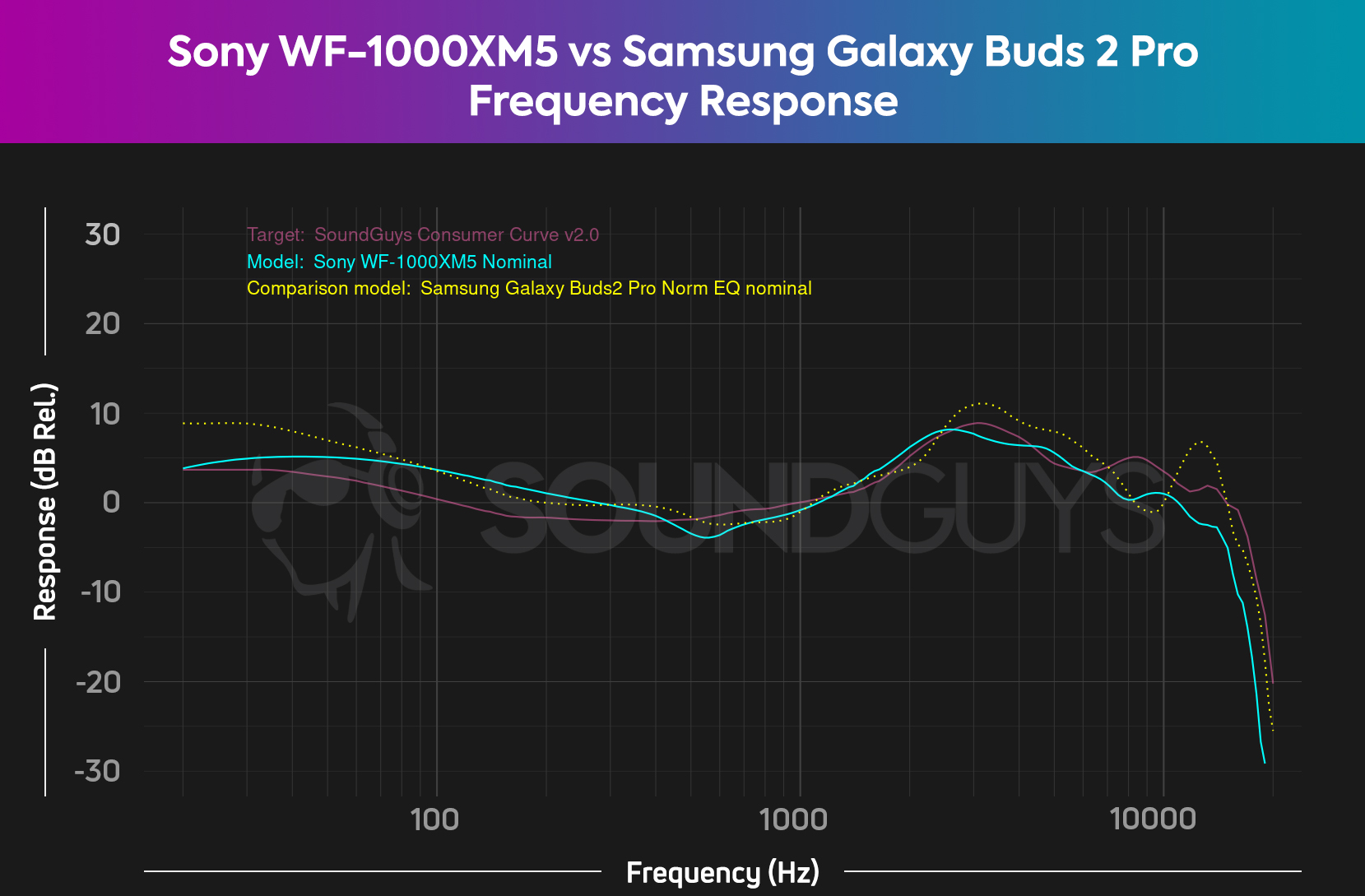
Broadly speaking, the Sony WF-1000XM5 and Samsung Galaxy Buds 2 Pro sound good. Their frequency responses loosely follow our headphone preference curve. Both supply a similar amount of bass (a bit more than we’d like) and have a similar midrange response. The key differences between the two are found in the treble range. The WF-1000XM5 generally follows our preference curve in treble frequencies and under-emphasizes everything content higher than 5kHz. Whereas the Galaxy Buds 2 Pro slightly exaggerates content from 2,500Hz through 7kHz.
Overall, the frequency response affects the Sony buds by giving them more “oomph” and a little less treble output. With the Samsung Galaxy Buds 2 Pro, you might find the sound a bit hyped, with louder bass and treble. We’re nitpicking with this test because they are flagships, and both sound good.
Sony and Samsung take different paths toward equalization, but you can EQ both the WF-1000XM5 and Galaxy Buds 2 Pro. Sony includes a five-band equalizer, so you can dial in your preferences precisely. Samsung includes EQ presets, which don’t differ dramatically from the default tuning. If you like to tinker, the Sony buds let you do that. If you’d rather set and forget, Samsung lets you do that.
Do the Sony WF-1000XM5 or Samsung Galaxy Buds 2 Pro have a better microphone?
Our Sony WF-1000XM5 test unit is a pre-production model. So while we await the arrival of a production unit, listen to the previous Sony WF-1000XM4 mics to get an idea of the starting place. The Samsung Galaxy Buds 2 Pro three-mic array sounds okay and rejects noise reasonably well. Some deeper voices may induce an artificially lispy sound. Take a listen below, and we will update the samples when we have them.
Sony WF-1000XM4 microphone sample (Ideal conditions):
Samsung Galaxy Buds 2 Pro microphone sample (Ideal conditions):
Sony WF-1000XM4 microphone sample (Windy conditions):
Samsung Galaxy Buds 2 Pro microphone sample (Windy conditions):
Sony WF-1000XM5 vs Samsung Galaxy Buds 2 Pro: Price and availability
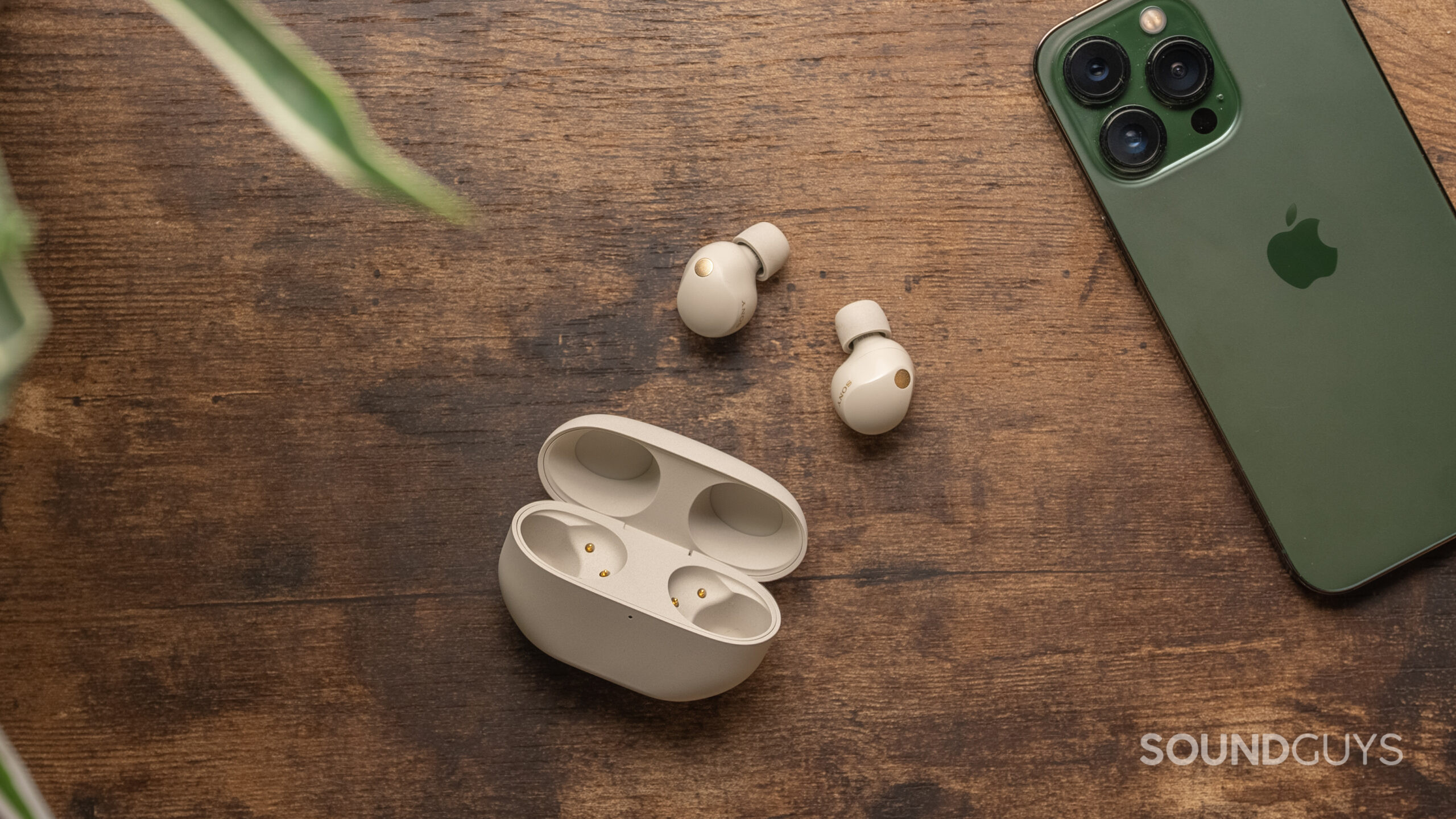
One of the advantages of the Samsung Galaxy Buds 2 Pro over the Sony WF-1000XM5 is that these buds came out a year earlier. Therefore, they’ve seen sale discounts, and the hype has calmed down, so they’re readily available. In contrast, the Sony WF-1000XM5 are newer, and their original price tag of $299.99 is already higher than the actual Samsung Galaxy Buds 2 Pro debut price of $229.99.
Should you get the Sony WF-1000XM5 or Samsung Galaxy Buds 2 Pro?
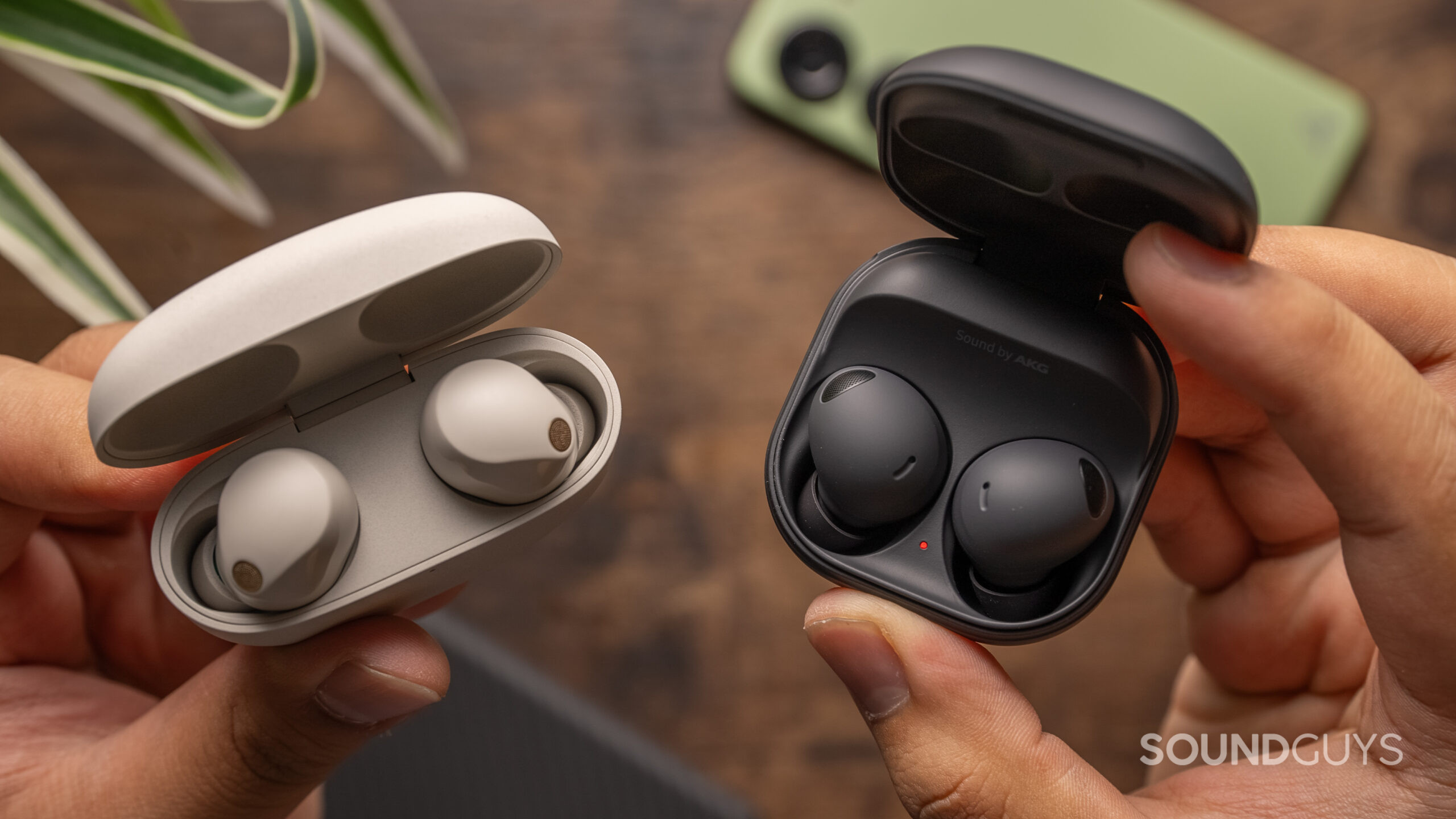
First, both sets of earbuds are competently executed and handily cancel noise. If you own an iPhone, the Sony WF-1000XM5 are the correct choice. Sony’s buds give you all the features on iOS, which is not true of the Samsung buds. That aside, the WF-1000XM5 has much better battery life than the Galaxy Buds 2 Pro — advantageous for prolonging the overall lifespan of your purchase.
Then again, the Samsung Galaxy Buds 2 Pro goes for a lot less money than Sony’s. As compromises go, you’ll need to weigh the value of less battery life, reduced isolation, and a walled Samsung ecosystem. That could be worth the compromise for your wallet’s sake. For folks looking to get durable earbuds, the waterproof IPX7 rating of the Galaxy Buds 2 Pro certainly outdoes the sweatproof IPX4 rating of the Sony earbuds.
Lastly, the Sony WF-1000XM5 supports multipoint, and the Samsung Galaxy Buds 2 Pro only allows you to switch between other Samsung devices using the same account. If you have a newer Samsung device, you can use the Samsung Seamless Codec for 24-bit audio, but if you have a different Android device, your choices include just AAC and SBC. Meanwhile, the Sony WF-1000XM5 lets you use LDAC with any Android device (or the usual AAC and SBC). Sony gives you an extra option, especially if you stream a lot of video and experience latency. So, which one you should buy depends mainly on your device and budget.

Comfortable
SBC, AAC, and LDAC support
Great app support
Great battery life

Enhanced noise-cancelling technology
Satisfying battery life
Should you get the newer Galaxy Buds3 Pro instead?
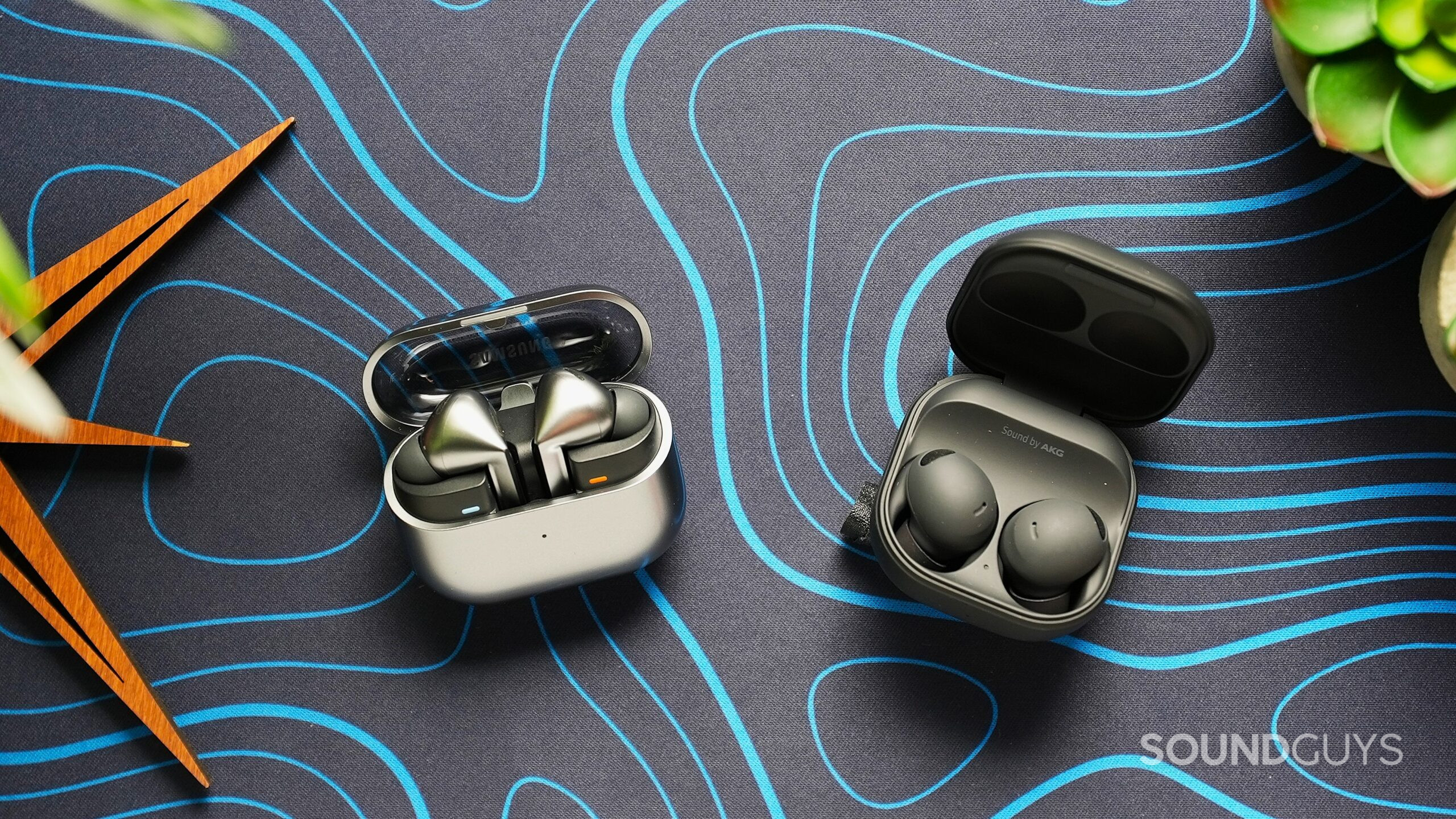
While the Galaxy Buds3 Pro offer some exciting AI features like real-time translation and improved specs with their dual-driver design, they actually take a step backward in some key areas compared to the Buds2 Pro. Most notably, the ANC performance is noticeably weaker on the newer model. The Buds3 Pro do have a slightly higher MDAQS score for sound quality, but the difference is minimal. They also introduce a new stem design that some may find less comfortable than the previous generation. At $249.99, they’re also priced higher than the Buds2 Pro, which can often be found on sale for around $179.
When compared to the Sony WF-1000XM5, the Buds3 Pro fall short in several areas. The Sony’s offer significantly better battery life (9.5 hours vs 4.5 hours), superior noise cancelation, and more consistent performance across both Android and iOS devices. While the Buds3 Pro do offer unique features like real-time translation and Samsung-specific codec support, the WF-1000XM5’s multipoint connectivity and more universal compatibility make them a more versatile choice. Unless you specifically need the AI translation features or are deeply invested in the Samsung ecosystem, both the Buds2 Pro and Sony WF-1000XM5 present more compelling options for their respective price points.

What should you get instead of the Sony WF-1000XM5 and Samsung Galaxy Buds 2 Pro?
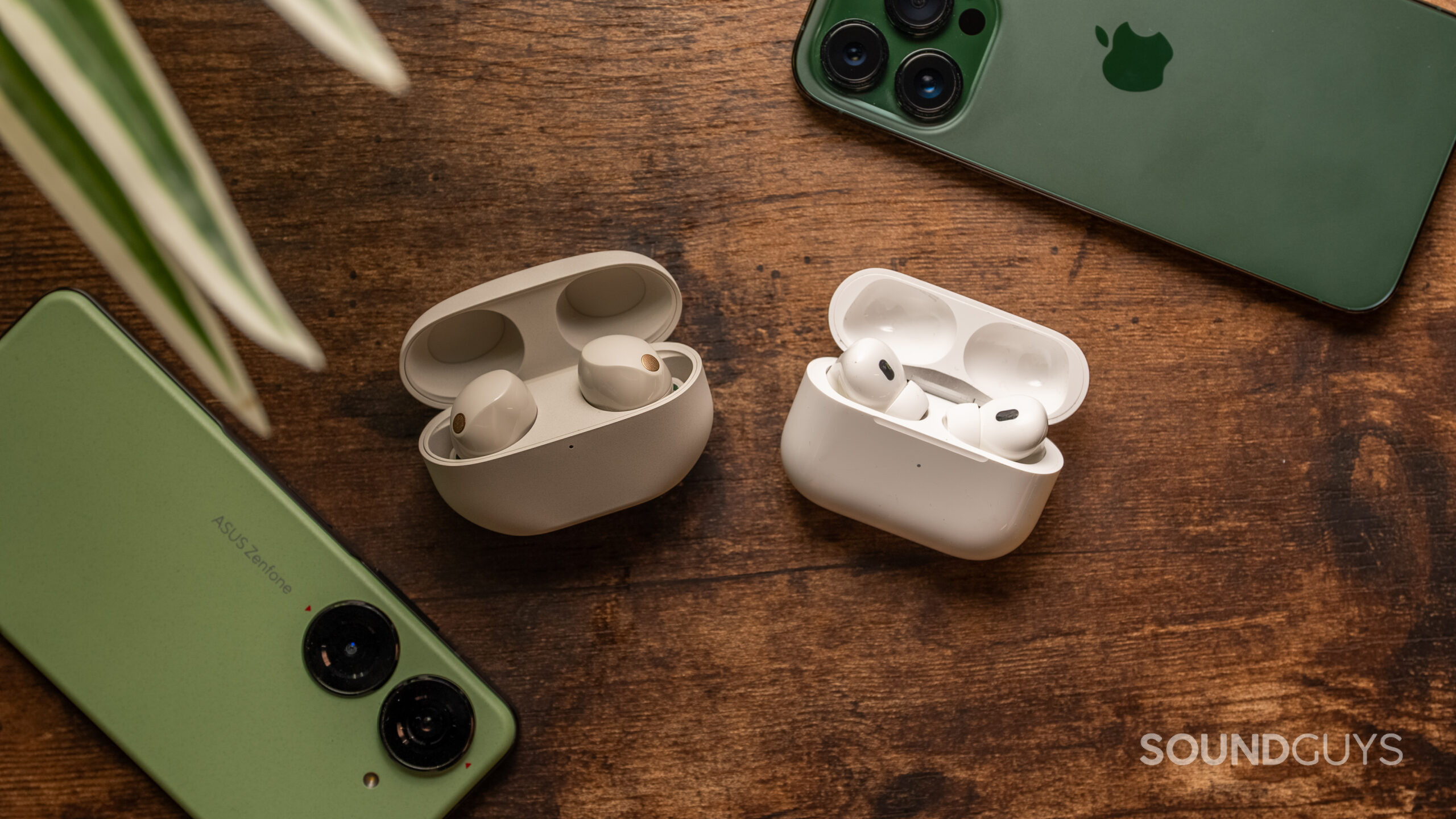
Depending on your priorities and budget, you’ve got a few alternatives. If you like the idea of a productivity-oriented set of earbuds, the Google Pixel Buds Pro ($199 at Amazon) supplies great ANC and a few Google goodies such as Translate. You’ll need an Android, ideally a Pixel phone, to eke the most out of these buds.
On the other side of the spectrum, the Apple AirPods Pro (2nd generation) for iOS are a worthy alternative to the WF-1000XM5 and Galaxy Buds 2 Pro. Provided you’re in the Apple camp already, you can use the H2 chip to switch Apple devices (like with the Samsung earbuds), and they sound pretty good. Also, the noise canceling is impressive. These have an IPX4 rating against sweat, like the WF-1000XM5. Pick the AirPods Pro (2nd generation) for $199.99 at Amazon.
If sound quality is a major factor, the Sennheiser MOMENTUM True Wireless 3 gets you pretty close to spot on. These IPX4-rated earbuds supply you with Bluetooth codecs aptX, aptX Adaptive (which works similarly to LDAC), AAC, and SBC. Sennheiser’s ANC is pretty good, too, for $169 at Amazon.
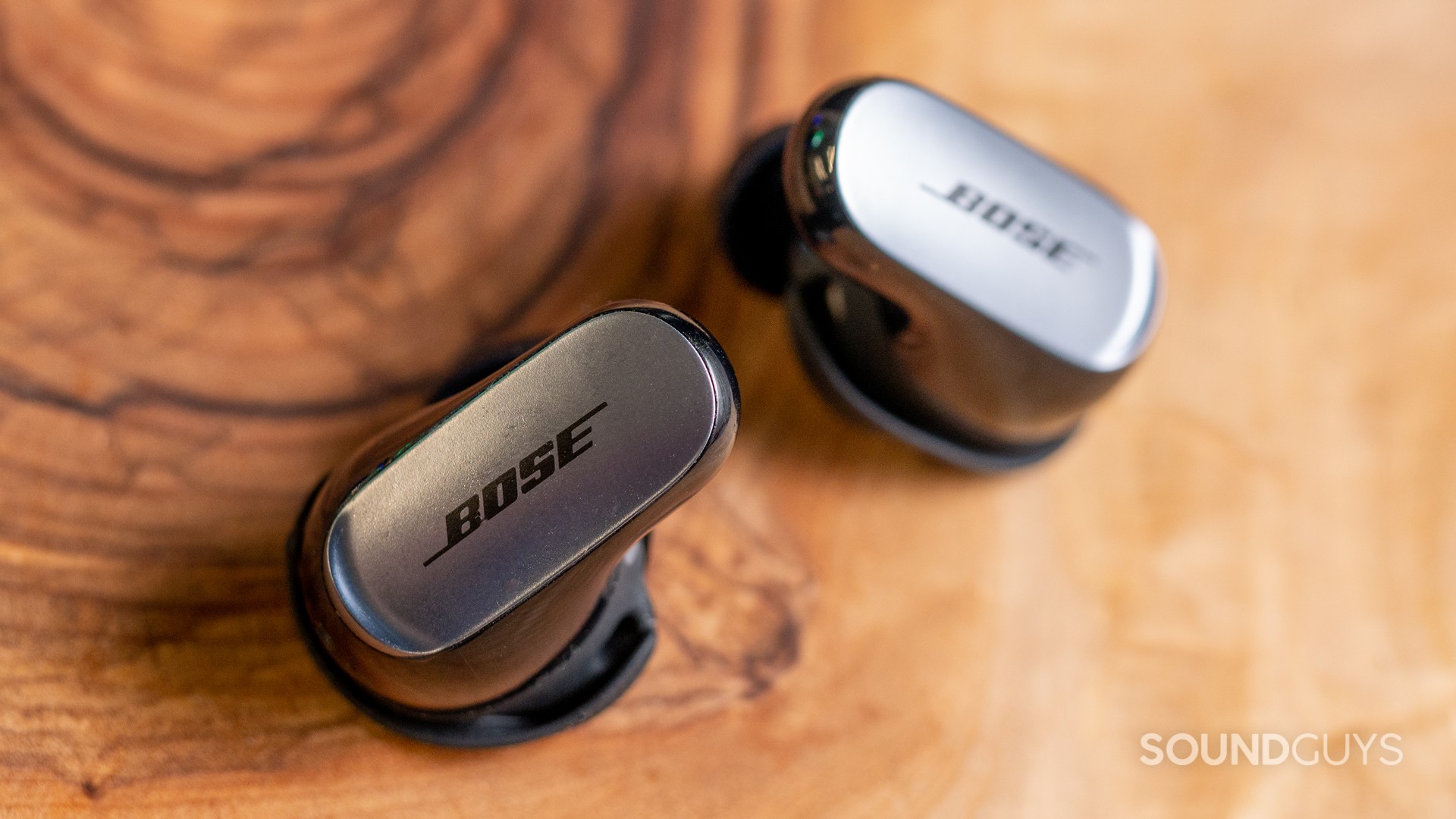
For the bass heads out there, the Bose QuietComfort Ultra Earbuds have some of the best ANC and a very bassy tuning for $299 at Amazon. They’re comfortable with an IPX4 rating and work the same regardless of whether you’re using an iPhone or an Android device. However, Android users with the latest phones will benefit the most with support for Snapdragon Sound.
Frequently asked questions
You can use both the Sony WF-1000XM5 and Samsung Galaxy Buds 2 Pro with an iPhone. However, you won’t gain access to many Galaxy Buds 2 Pro features with an iPhone, including the app, updates, and more. The Sony WF-1000XM5 offers the same app access on iPhone as on Android.
The Sony WF-1000XM5 has Bluetooth multipoint and can simultaneously connect to two devices through the app. In contrast, the Samsung Galaxy Buds 2 Pro does not have Multipoint. They won’t connect to multiple devices at once, but if you have two Samsung devices signed into the same account, they can switch between them seamlessly.
Yes, the Sony WF-1000XM5 and Samsung Galaxy Buds 2 Pro have wireless charging compatibility.
Fit is subjective. In our review of the WF-1000XM5, Harley states that these stay in his ears better than the previous WF-1000XM4. Similarly, the Galaxy Buds 2 Pro fit well too, owing to the textured finish. The smaller housing shapes of both earbuds mean the weight distribution sitting closer to the canal should help them stay in rather than poking out, but you don’t get stabilizers or ear hooks which guarantee they stay put.
The Sony WF-1000XM5 came out in the summer of 2023, and the Samsung Galaxy Buds 2 Pro came out in the summer of 2022.
Thank you for being part of our community. Read our Comment Policy before posting.